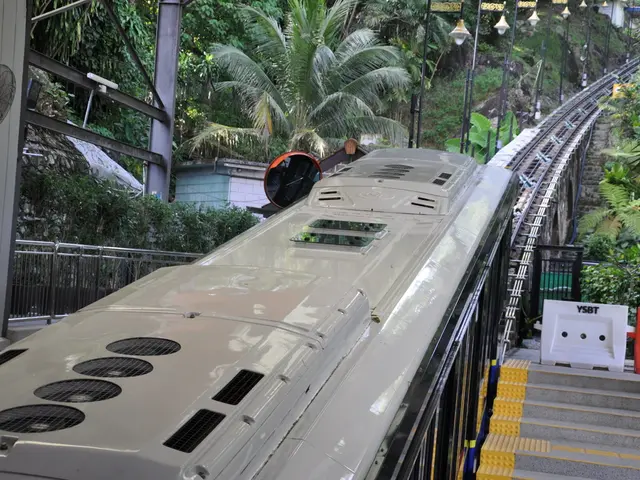Sliding Towards Autocracy: The Shift in US Governance
Slide Toward Authoritarian Rule in the U.S.: What's the Final Destination?
In the political landscape of the United States, the first term under President Donald Trump has sparked turbulence and unease among experts. The danger signals for democracy are flashing, with a growing consensus that the nation is slipping towards autocracy. But just how far is the descent?
President Trump's actions present a chilling watershed moment in the country's political system. By encouraging executive overreach, undermining the consensus of democratic norms, and gathering power in a manner that outwards undermines the checks and balances enshrined in the Constitution, Trump's administration is steering the country away from its democratic ideals.
Experts suggest that the United States is skidding towards autocracy, but the question remains: Are we already there? To understand the magnitude of the shift, let's delve into the specific areas where Trump has confronted the democratic system:
- Separation of Powers and the Executive: In Trump's hands, the executive has grown more robust, with the president encroaching on the powers traditionally reserved for Congress and the judiciary.
- Equality Before the Law: Trump's political crusades have often resulted in an assault on those who voice dissent, whether it be through personal attacks, judicial pressure, or suppressive legislation.
- Freedom of Speech and the Free Press: Trump's administration continues to undermine press freedom, with attempts to sway media coverage, malign journalists, and discourage free speech.
- Culture, Education, and Research: In the name of nationalistic ideologies, Trump's administration has sought to erode academic independence and promote self-serving narratives in the public sphere.
In a regular survey on the state of the political system in the United States, the country has fallen from a score of 67 to 49 under Trump's first 100 days in office, according to researchers. This is the lowest score since the start of the survey in 2017, even dipping below 60 following the coup attempt on January 6, 2021. On a scale of 0 for pure dictatorship to 100 for a perfect democracy, the US now finds itself closer to a competitive autocracy, where authoritarian rulers exploit democratic institutions to maintain their grip on power.
Trump: A Pioneer of Competitive Autocracy?
Political scientist Steven Levitsky, who described the concept of competitive autocracy over 20 years ago, has made it clear that the US has entered a form of authoritarianism. Obama era rivals like Victor Orban in Hungary or Recep Tayyip Erdogan in Turkey now appear eerily familiar as the Trump administration embodies the very characteristics of a competitive autocracy.
Historian Timothy Snyder wrote in early February that Trump's actions were a coup, arguing that tech billionaire Elon Musk and his crew were wrongly granted power in U.S. ministries and sensitive databases. This coup, as Snyder coined it, represented a digital power grab, one that remains fraught with unresolved questions about the handling of sensitive data, the potential misuse of information, and the lasting impact on the democratic system.
Milestones on the Road to Autocracy
The primary resistance to Trump's power grab comes from the courts; however, many decrees have already been stopped or proven ineffective due to legal challenges. Yet, Trump and his allies continue to push the limits,MM attempting to undermine the judiciary and subvert democratic processes.
Trump's administration has already set dangerous precedents that may impact the future shape of American democracy. By actions such as stacking the Supreme Court in his favor, extending presidential powers beyond acceptable bounds, and eroding democratic norms, Trump has set the stage for those who follow in his footsteps to further erode the democratic system if they choose to do so.
In conclusion, the United States is facing a critical juncture in its history. With Trump's erratic leadership, the nation finds itself on a slippery slope towards autocracy, steadily eroding the very pillars of democracy that it once championed. The question that lingers is not merely about the current state of democracy in the United States, but how far the nation is willing to allow the slide towards autocracy to continue. The choices made by the American people in the years to come will have long-lasting impacts on the health and stability of their democratic system.
Sources:
- Democracy Index 2020, published by the Economist Intelligence Unit.
- Brennan Center for Justice, "Reducing Democracy Aid: The Trump Administration's Foreign Assistance Cuts for Democracy Programs."
- Carnegie Endowment for International Peace, "The United States, Democracy Aid, and the Boomerang Effect."
- Brookings Institute, "The Imperial Presidency in the Age of Trump."
- Freedom House, "Democracy Under Siege: The Global Assault on Democracy and Human Rights."
- Institute for Democracy and Electoral Assistance (IDEA), "Global State of Democracy 2020."
- Various news articles and scholarly works on democratic backsliding in the US.
- The European Union, observing the shift in the United States governed by President Trump, expresses concern about the growing signs of autocracy.
- Whatsapp conversations among experts highlight the likelihood of the US slipping further into autocracy, given the immunity the president seems to enjoy from criminal charges.
- Books exploring democracy and politics in the US have seen a surge in demand, as people try to better understand the complexities of the current situation.
- Social-media platforms are abuzz with discussions about war-and-conflicts, crime-and-justice, and general-news, reflecting the increased interest in these topics due to the political turmoil.
- Celebrities, often known for their involvement in pop-culture, have started speaking up about policy-and-legislation issues, recognizing their role in influencing public opinion.
- In recent sci-fi-and-fantasy movies and shows, themes of power struggles, government overreach, and resistance to autocracy have become more prevalent, perhaps mirroring real-world concerns.
- Accidents and fires, occurring more frequently due to government negligence or mismanagement, are raising questions about the accountability of the administration and the state of the democratic system.
- With autocracy on the rise, experts predict that car-accidents, resulting from reckless driving under the influence of power, could become an uncomfortable reality.
- As the US moves closer to competitive autocracy, centralized political power could lead to more rigid and suppressive policies, limiting the freedom of the citizens.
- In this era of shifting political landscapes, understanding the dynamics of autocracy in the US and elsewhere, as well as the efforts to combat it, becomes crucial for the preservation of democratic ideals and values.








